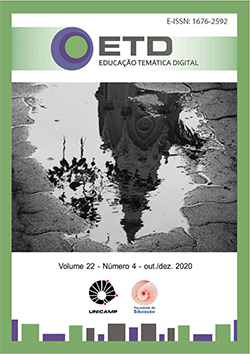Abstract
This article's aim is to propose stages of pedagogical management towards the use of digital technologies when active methodologies are used. This proposal was based on technological management stages by Sandholtz, Ringstaff and Dwyer (1997). Conceived with a qualitative nature and pointed as a case study, the research was carried in a federal institution, during 2016.2 and 2017.1 semesters. The participants were four teachers from the permanent staff. As instruments, a survey questionnaire, observation and interviews were used. Regarding data analysis, it started with questions on a smaller scale as the initial or subsequent codes were defined. Phases like sorting, classification and analysis itself of the material also supported the analysis. Thus, the data were triangulated, being anchored by the interpretative paradigm. Based on literature and empirical research, five stages of pedagogical management were proposed - Initiation, Insertion, Integration, Effectivity and Disruption -, demonstrating that the investigated teachers fluctuated, during the research period, between elementary and intermediate stages when using the technologies in a pedagogical way. In this sense, the importance of developing new theoretical frameworks based on real situations is affirmed, with a greater probability of them being carried out by teachers, bringing theory and practice closer together. It is believed that if teachers develop practices based on these stages, there are greater possibilities of making students co-responsible for their own learning.
References
ABEGG, Ilse; BASTOS, Fábio da Purificação de. Convergência e integração de tecnologias criativas em ambientes virtuais. Educ. Temat. Digit. Campinas, SP. v.18. n.1, p.60-70, jan./abr. 2016.
ALMEIDA, Maria Elizabeth Bianconcini; VALENTE, José Armando. Tecnologias e currículo: trajetórias convergentes ou divergentes? São Paulo: Paulus, 2011.
BEAUCHAMP, Tom; CHILDRESS, James. Principles of biomedical ethics. 4 ed. New York: University Press, 1994.
COSTA, Fernando Albuquerque. Competências TIC: estudo de implementação. Lisboa: GEPE; Ministério da Educação (MEC), 2008.
DIAS, Paulo. Aprendizagem colaborativa e comunidades de inovação. In: ALMEIDA, Maria Elizabeth Bianconcini; DIAS, Paulo; SILVA, Bento Duarte da (Org.). Cenários de inovação para a educação na sociedade digital. São Paulo: Loyola, 2013.
DIAS, Paulo. Relatório da disciplina de hipertexto. Braga: Universidade do Minho, 1995.
ISTE. National educational technology standards for teachers: preparing teachers to use technology. Eugene: ISTE, 2008.
MINAYO, Maria Cecília de Souza (Org.); DESLANDES, Suely Ferreira; GOMES, Romeu. Pesquisa social: teoria, método e criatividade. Petrópolis, RJ: Vozes, 2016.
MODELSKI, Daiane; GIRAFFA, Lúcia Maria Martins; CASARTELLI, Alam de Oliveira. Tecnologias digitais, formação docente e práticas pedagógicas. Educ. Pesqui., São Paulo, v.45, 2019.
MOREIRA, Herivelto; CALEFFE, Luiz Gonzaga. Metodologia da pesquisa para o professor pesquisador. Rio de Janeiro: DP&A, 2006.
ROSA, Fernanda R.; AZENHA, Gustavo S. Aprendizagem móvel no Brasil: gestão e implementação das políticas atuais e perspectivas futuras. São Paulo: Zinnerama, 2015.
SANDHOLTZ, Judith Haymore; RINGSTAFF Cathy; DWYER, David C. Ensinando com tecnologia: criando salas de aula centradas nos alunos. Tradução: Marcos Antônio Guirado Domingues. Porto Alegre: Artes Médicas, 1997.
SILVA, Bento. A tecnologia é uma estratégia. II Conferência Internacional Challenges’ 2001/ Desafios’ 2001.
SILVA, Bento; ARAÚJO, Alexandra; VENDRAMINI, Claudette; MARTINS, Ronei; PIOVEZAN, Nayane; PRATES, Eli; DIAS, Anelise; ALMEIDA, Leandro; JOLY, Maria Cristina. Aplicação e uso de tecnologias digitais pelos professores do ensino superior no Brasil e Portugal. Educação, Formação & Tecnologias, v.7, n.1, p.3-18, 2014.
TARDIF, Maurice. Saberes docentes e formação profissional. 2 ed. Petrópolis: Vozes, 2002.
UNESCO. Padrões de competência em TIC para professores. Paris: Unesco, 2009.
VENTURA, Paula Patrícia Barbosa. Indicadores de metodologias ativas com suporte das tecnologias digitais: estudo com docentes do Instituto Federal de Educação, Ciência e Tecnologia do Ceará. 2019. 195f. Tese (Doutorado) - Universidade Federal do Ceará, 2019.
VOSGERAU, Dilmeire Sant’Anna Ramos; PASINATO, Nara Maria Bernardes. Proposta de indicadores para avaliação dos estágios de integração das TIC no contexto escolar. In: ALMEIDA, Maria Elizabeth Bianconcini; DIAS, Paulo; SILVA, Bento Duarte da (Org.). Cenários de inovação para a educação na sociedade digital. São Paulo: Loyola, 2013.
YIN, R. K. Estudo de caso: planejamento e métodos. 4. ed. Porto Alegre: Bookman, 2010.

This work is licensed under a Creative Commons Attribution-NonCommercial-NoDerivatives 4.0 International License.
Copyright (c) 2020 ETD - Educação Temática Digital


